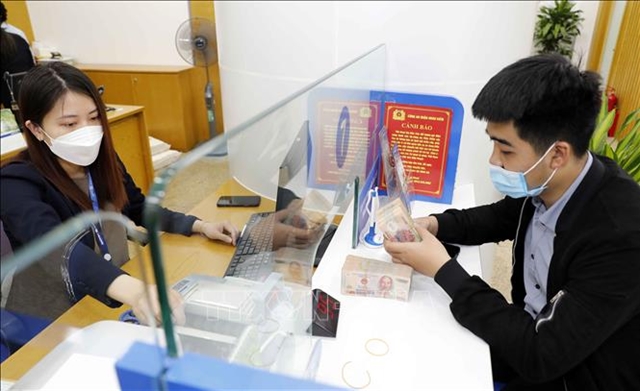 Economy
Economy

 |
| A customer conduct a transaction at a bank in Hà Nội. — VNA/VNS Photo |
HÀ NỘI — Việt Nam’s economy has shown remarkable resilience and growth in recent years, particularly in the realm of small and medium enterprises (SMEs).
Recognising the vital role these businesses play in driving economic development, the Vietnamese Government and various organisations are increasingly focused on creating a comprehensive financial ecosystem tailored specifically for SMEs.
This initiative aims to enhance access to finance, promote innovation and ultimately foster sustainable growth.
SMEs constitute a significant portion of Việt Nam’s economy, with approximately 40,000 enterprises and around five million individual business households, Trịnh Thị Hương, Deputy Director of the Enterprise Development Agency (EDA) under the Ministry of Finance (MoF), said at a conference on Wednesday.
According to the MoF, the private sector contributes about 51 per cent of GDP, over 30 per cent of the state budget, approximately 82 per cent of total employment and nearly 60 per cent of social investment capital.
These enterprises are crucial for job creation, innovation and regional development.
Despite their importance, however, SMEs often face numerous challenges, particularly in accessing financial resources.
One of the most pressing issues for SMEs in Việt Nam is the lack of access to affordable financing options. Traditional banks often regard these businesses as high-risk due to factors such as insufficient collateral, lack of credit history and limited financial transparency.
As a result, about 98 per cent of SMEs struggle to secure loans or are offered loans with exorbitant interest rates, which can stifle their growth potential.
Additionally, the financial literacy of SME owners varies widely, making it difficult for them to navigate the complexities of financing and investment. Many entrepreneurs are unaware of the various financial products available to them, which further exacerbates their challenges in obtaining necessary funding.
A comprehensive financial ecosystem
To address these challenges, the Vietnamese Government, in collaboration with financial institutions and business associations, is working to develop a comprehensive financial ecosystem for SMEs.
This ecosystem aims to create a more inclusive financial environment by improving access to funding, enhancing financial understanding and fostering innovation.
One of the primary goals of this initiative is to expand the range of financing options available to SMEs, said Lê Thị Xuân Quỳnh from Department of Policy, Business Environment and International Cooperation under EDA.
By diversifying funding sources, SMEs can reduce their reliance on traditional banks and find more suitable financing solutions for their specific needs.
Furthermore, encouraging banks are encouraged to develop tailored financial products specifically designed for SMEs. This could involve offering lower interest rates, longer repayment terms and more flexible collateral requirements.
There is also a pressing need to review and evaluate the challenges and obstacles in implementing Government Decree No. 34/2018/NĐ-CP, which governs the establishment, organisation and operation of credit guarantee funds for SMEs.
The goal is to facilitate the resolution of issues faced by existing SME guarantee funds and to explore mechanisms for creating a risk reserve fund.
Local authorities, including provincial and city governments, should prioritise funding and accelerate the enhancement of local guarantee funds for SMEs.
They must also continue to collaborate with the banking sector to implement the Bank-Enterprise Connection Programme, which enables timely identification and resolution of challenges faced by businesses.
The Việt Nam Association of Small and Medium Enterprises, along with various industry associations, should strengthen its role and influence as a vital link for SMEs to access credit institutions.
This includes acting as a central resource for supporting SMEs with market information, trade promotion activities, exhibitions and protecting the legal rights of member enterprises. — BIZHUB/VNS




